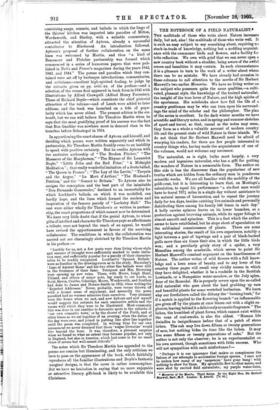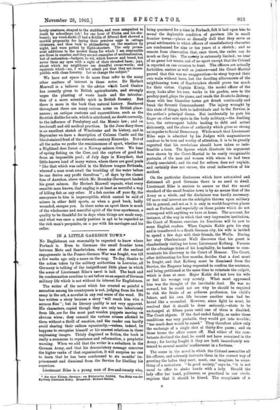. THE NOTEBOOK OF A FIELD NATURALIST.* THE multitude of
those who write about Nature increases daily, but not, alas ! the multitude of those who write well. It
is such an easy subject to say something about, requiring no stock-in-trade of knowledge, nothing but a nodding acquaint.
ance with the commoner birds and flowers, and a facility for trite reflection. We own with grief that we can never open a new country book without a shudder, being aware of the awful errors and banalities it may contain. In such circumstances it is a pleasure to turn to the work of a writer about whom there can be no mistake. We have already had occasion in these columns to call attention to the merits of Sir Herbert Maxwell's two earlier Memories. We have no living writer on the subject who possesses quite the same qualities,—a culti- vated, pleasant style, the knowledge of the trained naturalist, the insight of the true lover of Nature, and the high spirits of the sportsman. His notebooks show how full the life of a country gentleman may be who can turn upon his surround- ings the mind of the scholar and the philosopher. The plan of the series is excellent. In the dark winter months we have scientific and literary notes, and in spring and summer sketches of sport and travel, so that, casual as the notes may seem, they form as a whole a valuable account of modern country life and the present state of wild Nature in these islands. We do not think that Sir Herbert Maxwell need be afraid of wearying his readers, for there are few people interested in country things who, having made the acquaintance of one of the volumes, would not welcome any successor.
The naturalist, as is right, bulks most largely, a very modern and ingenious naturalist, who has a gift for putting the wonders of Nature in a memorable form. The author on this side is less the discoverer than the populariser of new
truths which are hidden from the ordinary man in ponderous scientific works. We are all familiar with the mobility of the gold-crest, but it is interesting to learn that, on Montagu's
calculation, to equal his performance "a six-foot man would have to travel 7071 miles in a single day without assistance to his natural means of locomotion, and to repeat the journey daily for ten days, besides catching live animals and personally distributing them among his family 546 times in each day." A holly carries spinous leaves on its lower branches, as a protection against browsing animals, while its upper foliage is almost smooth and spineless. This is a fact which the author seems to have established, but he stops short of speculation on the subliminal consciousness of plants. There are some interesting stories, the result of his own experience, notably a fight between a pair of lapwings and a pair of black-backed gulls more than six times their size, in which the little birds won; and a peculiarly grisly story of a spider, a very Messalina among the arachnida, which serves to point Sir Herbert Maxwell's constant argument on the heartlessness of Nature. The author writes of wild flowers with a full know- ledge and a keen sense of beauty, and to any lover of the country these pages will recall very vividly scenes in which they have delighted, whether it be a roadside in the Scottish Lowlands, or a Hampshire water-meadow, or the July splen- dour of the Romsdal. He is properly severe upon the so-called field naturalist who goes about the land grubbing up rare and beautiful plants for some wretched herbarium. We learn why our forefathers called the dittany the " burning bush," for if a match is applied to the flowering branch "an inflammable gas given off by the plants at once blazes out with a slight ex- plosion, leaving behind it a deliciously aromatic fragrance." The lichen, the humblest of plant forms, which cannot exist within the zone of coal-smoke, is also the oldest. "Human life dwindles to insignificance before that of a patch of stone lichen. The oak may live down fifteen or twenty generations of men, but nothing bides its time like the lichen. It may live some fifteen or twenty generations of oaks." But the author is not only the observer; he is an experimentalist on his own account, though sometimes with little success. Who will not sympathise with such misfortunes ?—
" Perhaps it is our ignorance that makes so conspicuous the failure of our attempts to acclimatise foreign species. I care not to reckon how many of my saxpences ' have gone bang ! with nothing to show for them. My spoonbills flew to other mores, and were shot by excited field naturalists ; my purple water-hens, • Meineries of the Months. Third Series. By the Right Hon. Sir Herbert Bargee% Bart., M.P. London : E. Arnold. gs. 6d.] lovely creatures, strayed to the stubbles, and were catapulted to death by schoolboys (oh ! for one hour of Elisha and his she- bears) ; my wood-ducks (I had a flotilla of fifteen) first showed a morbid propensity for laying their precious eggs in cottage chimneys, and then took to philandering on the seashore by night, and were potted by flight-shooters. The only perma- nent additions to the modest fauna for which I am responsible are three in number, and they are not examples of acclimatisatiora, but of restoration—badgers, to wit, which burrow and breed, but never bless my eyes with a sight of their streaked faces ; jays, about which my neighbours use dreadful swear-words; and squirrels which—no, I will not admit yet that they are incom- patible with clean forestry. Let us change the subject."
We have not space to do more than refer to the many other matters of interest in these notes. Sir Herbert Maxwell is a believer in the advice vasich Lord Onelow
has recently given to British agriculturists, and strongly urges the planting of waste lands and the introduc- tion of a more scientific spirit in British forestry. But there is more in the book than natural history. Scattered throughout there are many curious notes on British plaee-
names ; on antique customs and superstitions, such as the Scottish dislike for eels, which is attributed, no doubt correctly, to the influence of Presbytery and the Mosaic law ; and on
leech craft and old medical practices. In the June diary there is an excellent sketch of Winchester and its history, and in
September we have a description of Culzean Castle and the blood-stained feud of the sixteenth-century Keruaedys. But of all the notes we prefer the reminiscences of sport, whether on a Highland deer forest or a Norway salmon river. We hear of spring fishing on the Cree, and the capture of good fish from an impossible pool ; of July days in Knoydart, that little-known land of many waters, where there are good pools "like that which was called in the Hebrew tongue Bethesda, whereof a man must await the troubling of the water before he can derive any profit therefrom " ; of days by the classic foss of Aarnhoe, above which Mr. Bromley-Davenport landed his great salmon. Sir Herbert Maxwell repeats, what every sensible man knows, that angling is at least as merciful a way of killing fish as any other. If a fish carries off your fly, the annoyance to him is imperceptible, which cannot be said of
misses in other field sports, as when a good buck, badly wounded, escapes you. In these notes on sport there is much of the wholesome and merciful spirit of the true sportsman, a quality to be thankful for in days when things are made easy, and what was once a manly pastime is apt to be regarded as the rich man's perquisite, on a par with his carriages and his cellar.



















































 Previous page
Previous page